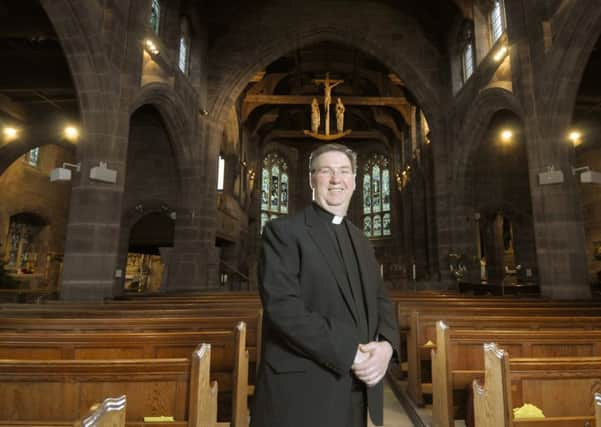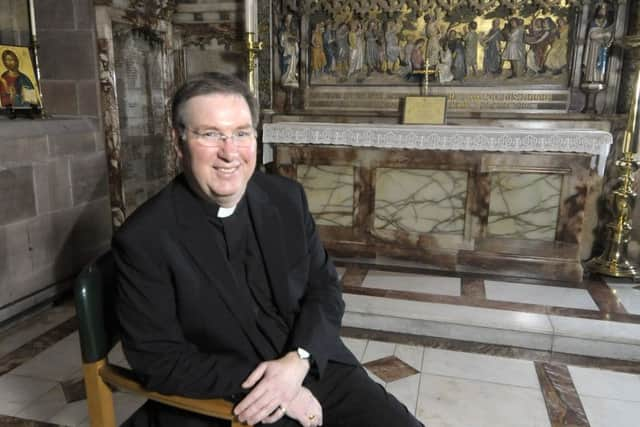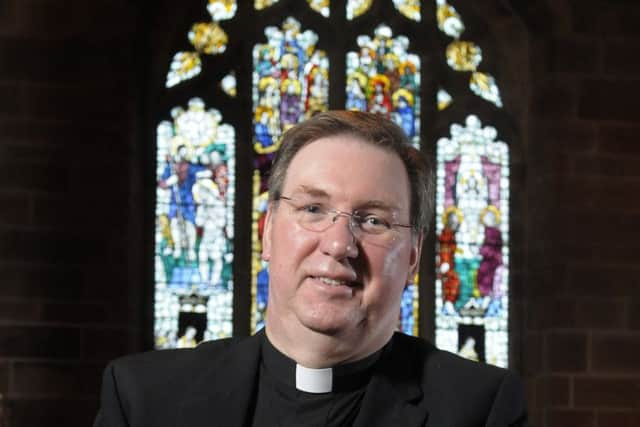Vicar of St Stephen on-the-Cliffs provides a beacon of hope in a world of change


“I don’t think it’s the busiest time,” says the 57 year old Vicar of St Stephen on-the-Cliffs at North Shore. “Easter is much busier in terms of services. Christmas is very busy but the busy-ness is compacted into a shorter period. Advent doesn’t make very much impression on anyone these days but partly because I’m involved in lots of things in the town there are lots of extras to do and a bit like the Vicar of Dibley I find myself attending one Christmas lunch after another. So socially it’s busier.”
Advertisement
Hide AdAdvertisement
Hide Ad“My then archdeacon Nicholas Reade came up to this diocese to be the diocesan bishop and out of the blue rang me and said ‘I think I’ve got a job that has your name it.’”


It was – and is – a two part job. In addition to his St Stephen’s responsibilities he also looks after the property department for the Blackburn diocese.
“He thought the two jobs and me might fit together alright. He invited me and I couldn’t think of a reason why not to come.”
So is it a “job” or a vocation?
“That’s certainly what Bishop Nicholas called it when he rang me but I think underneath that title is a lot more of course. But it’s what I spend my working hours doing and a lot of my leisure hours as well. In many ways I don’t think it’s terribly different to the job of a doctor or a nurse or a good teacher, we might call them all vocations but I think I’m happy to have it described as a job.”


Advertisement
Hide AdAdvertisement
Hide AdHe grew up in Somerset, trained for the ministry in Chichester and his first post was in Rotherham.
But it wasn’t his first “job.” After school he trained as an electrician and electrical engineer and ran his own business for some 10 years while working on a voluntary basis for the church and only being ordained in his late 20s.
It comes in useful. He belongs to the Diocesan Committee - basically the planning authority for church buildings, and “advises on electrics and lighting and helping parishes get over the various hurdles to get their re-wiring done, new lighting schemes and so on. It helps the buildings be used for things other than worship, particularly country parishes where there are no other community facilities.”
But surely Brighton and Blackpool are very different?
“A lot of our seaside towns have areas of deprivation, I suppose almost all of my ministry except one short period has been working in areas of deprivation. They have different needs of some kind or another but also that’s combined with having a lot of visitors, and I enjoy that. We get a lot of holidaymakers here at St Stephen’s during the summer and I enjoy meeting them.
Advertisement
Hide AdAdvertisement
Hide Ad“I only worked in what might be described as an affluent parish for one short period of my ministry and I have to say I didn’t enjoy that very much.”
From a working class background (“it sounds a bit of a label these days”) and being brought up on council estates he says: “I suppose I find myself more at home in that kind of setting and I enjoy doing what I can to help and support the community.”
As for the town’s bad headlines: “I’ve seen programmes similar to the ones that have not been terribly good for Blackpool about Brighton. Like a lot of seaside towns, go two or three streets back from the sea and things change quite a bit.”
Part of his parish in Brighton was “one of the biggest and most deprived council estates in England.”
Advertisement
Hide AdAdvertisement
Hide Ad“People don’t see that. People who live in Blackpool might see what it’s like in Blackpool but people who visit see the shiny lights on the front and some of the hotels and think ‘oh that’s very nice’ but certainly some parts of Blackpool that were once very affluent, including this North Shore area, you only have to look at the houses, they look very grand but lots of them are turned into bedsits, apartments and nursing homes these days.
“Yet look back 25 or 30 years and there were still some very wealthy people attended St Stephen’s.
“It was a very fashionable church, and certainly back into the 40s and the 50s if you lived on the North Shore of Blackpool you were doing very well, a senior manager in a mill, or something like that or part of theatrical life in Blackpool.”
In fact his church boasts its own Actors’ Chapel – with tablets inscribed with the names of entertainers such as Noel Coward and Ivor Novello, theatrically themed stained glass windows and a Madonna statue donated by Tessie O’Shea.
Advertisement
Hide AdAdvertisement
Hide Ad“I don’t think something like that would happen today,” he says. “Theatre land in Blackpool like everywhere else has changed, the stars would come for the summer and perhaps take a house or stay in a hotel and they’d be there for the whole season, and many of them would come to services here. That really doesn’t happen anymore. Those stars that do come just fly in and fly out again or perhaps stay a night or two in hotels.”
But the chapel is still popular.
“We’ve a very interesting visitors’ book from that era and it’s one of the things that people most often ask to see,” he says.
To that end the church is open as often as possible.
“Sadly we can’t leave it open all the time like we would have done 10 years ago but there’s someone around for most of most days, we do try and open as much as possible but we had some quite serious problems two or three years ago. Someone tried to light a fire and we regularly got the offertory boxes broken into. That’s not the end of the world but when it’s all added together there’s just a general unease at leaving the building unattended.”
And the church itself?
“I think we would describe ourselves as a traditional Anglican church, we use traditional services, we have a robed choir and an organ so our services are choral for the most part, but quite regularly we have less formal services when there are lots of children there. We do different things on different days, I like to think we cater for everyone - but certainly we are on the traditional end of the scale.
Advertisement
Hide AdAdvertisement
Hide Ad“Things do change but slowly enough for us not to make things dramatically different all at once. Over the time I’ve been here I think we have changed, perhaps more in terms of work in the community than in our worshipping lives.”
So there’s “a bit of a food bank here, lunches, drop in events, more activities in ways of helping to provide clothing for the local community which even 10 years ago we perhaps wouldn’t have even thought about.”
That and other things had evolved organically.
“I don’t think there was a time when we thought ‘oh dear we’d better do things differently, it’s just grown in response to the community changing I think.”
What changes?
“I think seaside towns do have a lot of people who come thinking the streets are paved with gold. Perhaps they come as children and they have a good time, then later find themselves homeless and out of work and they come back in summer and quite often find a bit of employment. And then, of course, the Illuminations go off and they find themselves here with not much income and not very good places to stay - but stay they do and think it’s going to get better next week.”
Advertisement
Hide AdAdvertisement
Hide AdHe admits when he and his family first came here he wasn’t sure what he’d let himself in for.
“I mean I love it now but I did wonder whether I’d made a mistake when I first came. I don’t think it stopped raining for nine months after I arrived, but I can’t easily imagine myself anywhere else now. I feel very settled here.
“When I was first here I asked ‘why do people come to Blackpool?’. Not in a nasty sense. Coming for the Illuminations is one thing but for a holiday? You could probably get a better one cheaper on the Costas.”
But he concedes if they didn’t love it they wouldn’t come and “you can go onto the upper prom when the sun is shining and it’s beautiful, as good as anywhere else in Europe.”
Advertisement
Hide AdAdvertisement
Hide AdApart from the weather, if he had a magic wand what would he change?
“I would tidy up the promenade more, there’s lots of work going on in the Tower and elsewhere but there are still some terrible eyesores on the prom and I think people notice that. They drive up the prom and they see buildings dropping to bits and badly neglected and sadly they remember that when they go away. “So it would be to tidy up and make more of some fine buildings that are hidden away between a lot of grot.”
Another sore point is “the way some of our communities are living in terrible accommodation. Some the places that people are living in on a permanent basis are awful.
“I do fear that many of our terraced streets, certainly around central Blackpool, will just end up getting worse and worse, and some of the temporary accommodation is shameful really. Some places that people who find themselves out of work and homeless are expected to live in are absolutely dreadful.”
And the silver lining?
Advertisement
Hide AdAdvertisement
Hide Ad“There is the will amongst the majority of people to make Blackpool a good place to live and a good place to visit. It’s against the odds really, economics are not in its favour, but they’re not in favour of any of our towns.
“I see a lot of people working very hard in the background trying to make Blackpool a good place to be. I have high hopes for the town.
“Whereas for quite a long time it was a case of ‘what can I get out of Blackpool and put the least back in,’ there are people now who are beginning to think what can I do for the long term, what can we do to make it a better place?”
What does Blackpool mean to you?
The Gazette has launched a new weekly series championing and celebrating the people that make Blackpool the incomparable place it is. The Gazette is Blackpool’s biggest supporter and will continue to be so, every day we feature your achievements and success stories. We’re giving Sandgrown’uns and the town’s army of supporters a platform to tell us why you think Blackpool is great, why you fell in love with the place, what challenges you think it faces and why we should stand up and show the ill-informed critics a more realistic picture. We want you to get involved - tell us who you think we should feature. Who embodies the spirit of Blackpool? Who is the every day person who can inspire others to focus on celebrating the town rather than castigate? This is your town, your paper, your voice.
We look forward to hearing from you.
Contact
• by email [email protected]
• by phone (01253) 361842
• twitter: @andyjsykes
• www.facebook.com/BlackpoolGazette